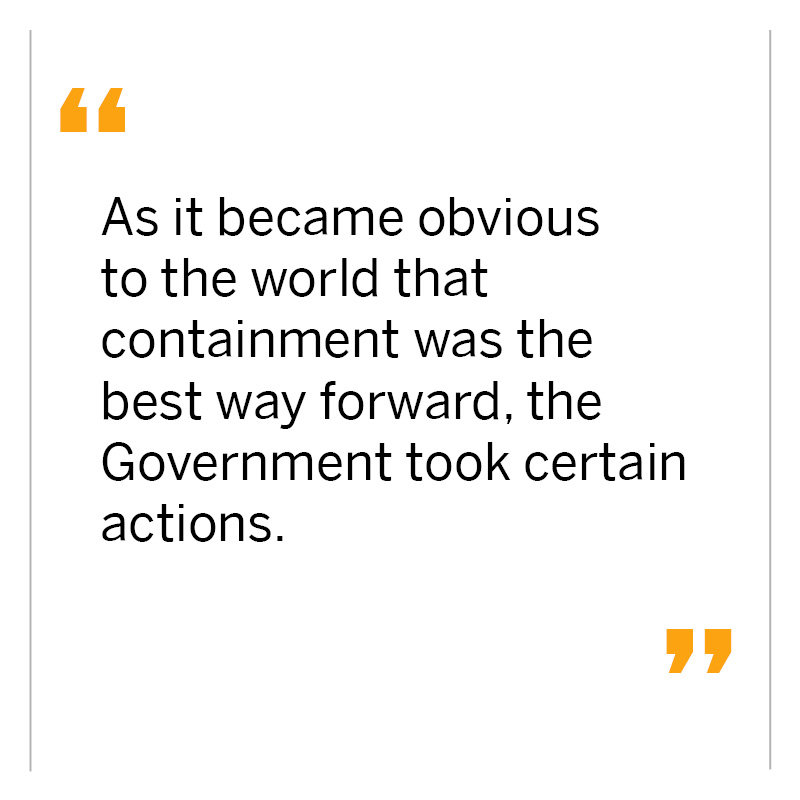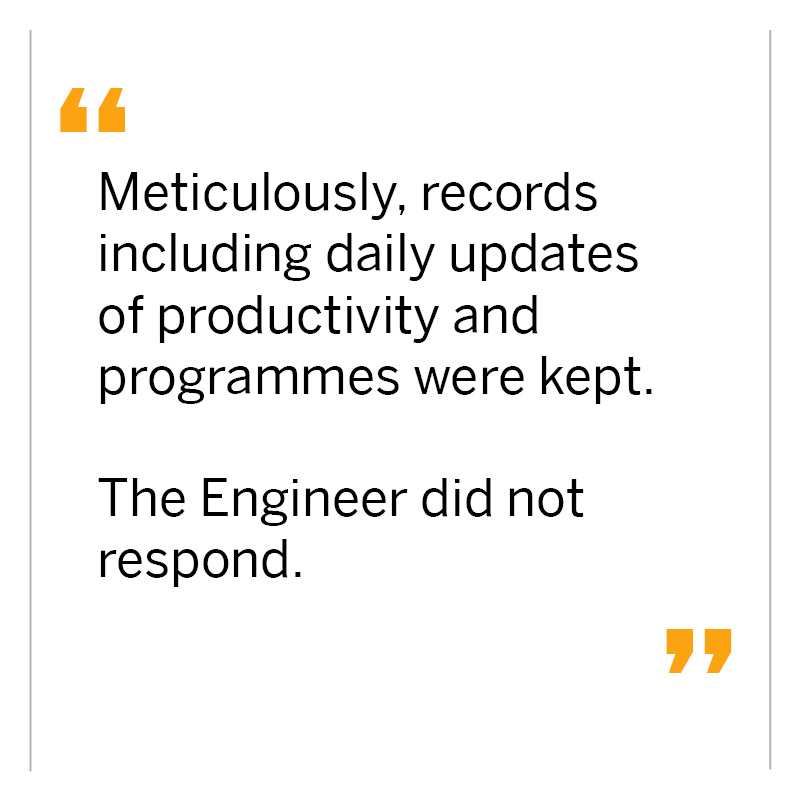It’s 1 April 2023 and my name is Paul Brown; my middle name is Emmett so I have the nickname Doc! I am sitting outside an arbitration hearing room waiting to give evidence as a witness of fact relative to a project that we were constructing. I’m pretty nervous and will be glad to get this over so I can get back to my proper job; it’s taken too much of my life over the last three years.
Just to introduce myself, I am the Commercial and Contracts Director for Water Purification and Supply, a global company within the water sector of the construction industry. Simply put, we take foul or dirty water from any source, treat that water and send it back to households or industry.
In 2020 we were constructing, what to us, was a normal project on a design and build basis; taking dirty water from houses in a town via a network of sewage pipes to a water treatment plant (that we were constructing) such that potable water could be sent back to the houses via another network of pipes.
The project was funded by an aid agency and the contract, whilst badged as a 1999 FIDIC Yellow Book, was heavily amended. The Employer was the Government Water Authority and the Engineer was the General Manager of the Water Authority.
We were awarded the contract in the summer of 2018 and it had a completion date of Friday 13 August 2021.
It really was a typical project for us with the only foreseeable area of problems being access to the streets within the town to excavate the trenches and then lay the two sets of pipes. The water treatment plant was on its own site just outside the town, so we should have had unhindered access to construct what was a fairly standard treatment plant.
All was going reasonably well in early 2020 apart from one claim issue which was heading towards being a dispute; following a period of extremely heavy rainfall there had been a landslip affecting 1 km of the route of our pipelines. We contended that the area had not been handed over to us and the Employer believed the roadway had been handed over to us. We cited a lack of access and the Engineer cited, amongst other things, that we should have taken better care of the Works.
It caused a delay that was on the critical path wherever the risk sat.
However, that was put to one side when we were all affected by what we later called the COVID-19 pandemic.
As we all understand the virus became known to the world in early 2020; it first came to our serious attention around mid-February. Like many contractors and employers alike, we had no concept of how serious it would be but felt the best thing to do was issue a notice of a Force Majeure, since we believed the virus would fall under the defining part of that clause even though we had not suffered any affects at that time. We doubled up by issuing, in good time, a notice under Sub-Clause 20.1; just to be certain there could never be any arguments about a failure to issue a notice causing a time bar. The Engineer did not respond, I guess they were uncertain as to how to respond given that there was a lot of political pressure to get the project completed before elections took place.

As it became obvious to the world that containment was the best way forward the Government took certain actions; I remember those days well.
- On 1 March 2020 it declared a Public Holiday between 2 March and 22 March 2020;
- On 23 March 2020 it declared that on 31 March 2020 its borders would be closed and advised all foreigners that they must leave the country by 31 March 2020. Most of our site supervision team and our specialist sub-contractors at the treatment plant were affected;
- Also, on 22 March 2020 the Government introduced social distancing regimes; everyone in the workplace should keep at least two metres apart, wear face masks at all times and be in their homes by 4.30pm when a curfew commenced until 6am the next day.
As you can imagine, we debated long and hard on how to respond to the Government’s actions; also being mindful that some deliveries of our equipment were delayed as a factory in the Far East had been closed and this compounded by customs being closed for the Public Holiday. For us only to pursue claims under the heading of Force Majeure would, if successful, entitle us to only time extensions and no contribution to the losses we would undoubtedly be facing. Whilst we were uncertain of the future we made three decisions: firstly, to maintain the most precise records possible of all delays and disruption to our work no matter what the cause; secondly, to identify methods of gaining entitlements for time and money; and thirdly, to review the situation on a daily basis as the impacts of the virus appeared to change frequently.
The Public Holiday effectively took away our local workforce such that productivity was lost through the treatment plant and the streets in which trenches were being dug and pipes laid. However, some labourers working in the streets volunteered to continue through the Public Holiday to maintain some progress. We changed our method of working to dig, lay pipes and backfill short sections to maintain safety and prevent trenches from collapsing. Most came back to work after the holiday although the excavation and pipe laying became difficult when trying to social distance, wear masks and be home by 4.30pm.
Productivity was severely affected.
 Whilst closing the borders meant that all our ex-pats returned home, we did have a significant number of local supervisors that could maintain progress, together with local workers, within the street sections of the Works. The treatment plant was at a stage that relied upon equipment being installed by specialist ex-pat subcontractors. Since they had to leave, this portion of the project effectively stopped. Notices were issued, in due time, primarily under Adjustments for Changes in Legislation. Meticulously, records including daily updates of productivity and programmes were kept. The Engineer did not respond.
Whilst closing the borders meant that all our ex-pats returned home, we did have a significant number of local supervisors that could maintain progress, together with local workers, within the street sections of the Works. The treatment plant was at a stage that relied upon equipment being installed by specialist ex-pat subcontractors. Since they had to leave, this portion of the project effectively stopped. Notices were issued, in due time, primarily under Adjustments for Changes in Legislation. Meticulously, records including daily updates of productivity and programmes were kept. The Engineer did not respond.
We, the senior site team, all flew home on various dates prior to 31 March 2020. Back in our various countries’, lockdown had been instigated such that we all had to work from home. We managed the project as best we could, given the poor internet connection at the site offices.
As the months moved on, we suffered new causes of delay. The customs authorities became short staffed, probably due to people catching the virus, and we often ran out of dirty water and potable water pipes. The issues at customs also affected the supply of food to the less wealthy, resulting in demonstrations within the streets of the town; our workforce, fearing for their safety, stopped work and did not return for some days. To curb a spike in infections a cordon was put around a portion of the area that contained the treatment plant such no-one could get to work, the Engineer confirmed that we must obey all Government notices and declarations of all types relative to the virus.
We always issued the notices in good time, citing many Sub-Clauses hoping that both time and money would be recovered. These included: Right of Access, Labour Laws, Health and Safety, unavailable goods and personnel caused by epidemic or government actions, Authorities, Suspension of Work, and Commotion and Disorder.
Our claims for time and money were always submitted in time and were fully detailed to a comprehensive level.
As at 1 September 2020 the Engineer still had not responded.
We continued to review the matter and found that it was a good idea to put COVID out of our minds when considering which was the best option for us to attempt to recover our mounting losses and growing delays.
During the summer of 2020 other events started to cause an impact. The Employer was late in paying the Interim Payments Certificates issued by the Engineer. We chose not to make a big thing of this for a while, as no contractor likes to annoy a potential long-term client, however, as a company, the effects of COVID-19 were global and were impacting the cash flow and profitability of all our projects. As my boss said, “in December 2019 we had 49 major projects around the world, 6 of them had issues. Going forward in March 2020, 49 projects have issues and will have losses and the time to recover”. We had to take action.
The lack of payment by the Employer (blamed on COVID-19 affecting funds arriving from the lending agency) and silence from the Engineer regarding our requests for entitlements, meant that no amounts were included within Interim Payment Certificates. This caused us, on 28 September 2020, to issue a notice that we were to suspend work, and we did indeed stop work, such that it was.
Whether or not it was connected with our notice of suspension (and other contractors making claims on other projects) on 1 October 2020 the President issued a Decree that COVID-19 was a Force Majeure event and should be considered as such in all commercial matters throughout the country.
The Engineer quickly responded to all of the claims citing the Decree, rejecting all money claims and challenging that we had any delay to the Works, since our local labour could work and there was no impediment to recruiting local supervision and workers for all of the project’s installations. We argued without success.
On 1 January 2021, a second Decree was issued ending the Force Majeure, the borders were re-opened such that our ex-pat staff and those of our sub-contractors could return and all Covid related measures implemented by the Government were revoked. Also, that day, the Employer paid all certificates that had been issued; we decided to return to work.
We soon commenced the dispute procedure by issuing a request for arbitration (one of the amendments made to the FIDIC standard form was the removal of the DAB) since the Engineer refused to amend the standpoint of only a Force Majeure would apply.
The project continued suffering some delays, which the root cause was no doubt the pandemic. We continued to seek our entitlements under the most relevant Sub-Clause. The project was finally completed on 13 August 2022, one year late.
As the arbitration proceeded, our pleadings reflected the various periods of delays and disruption seeking our entitlements under the relevant Sub-Clauses.
 The Employer continued to rely upon the Government’s Decree that all commercial contracts suffered a Force Majeure but noted firstly, that we were responsible for supplying all personnel and materials, and secondly, that we had abandoned the Works and were lucky not to have been terminated. We had decided not to terminate despite having good reasons to do so.
The Employer continued to rely upon the Government’s Decree that all commercial contracts suffered a Force Majeure but noted firstly, that we were responsible for supplying all personnel and materials, and secondly, that we had abandoned the Works and were lucky not to have been terminated. We had decided not to terminate despite having good reasons to do so.
For sure, the Tribunal will be able to cut through all that has gone on and will make the right Award
– I hope so…
*Any similarities or references to projects in this article bare no grounding to any current projects, and are entirely fictional.